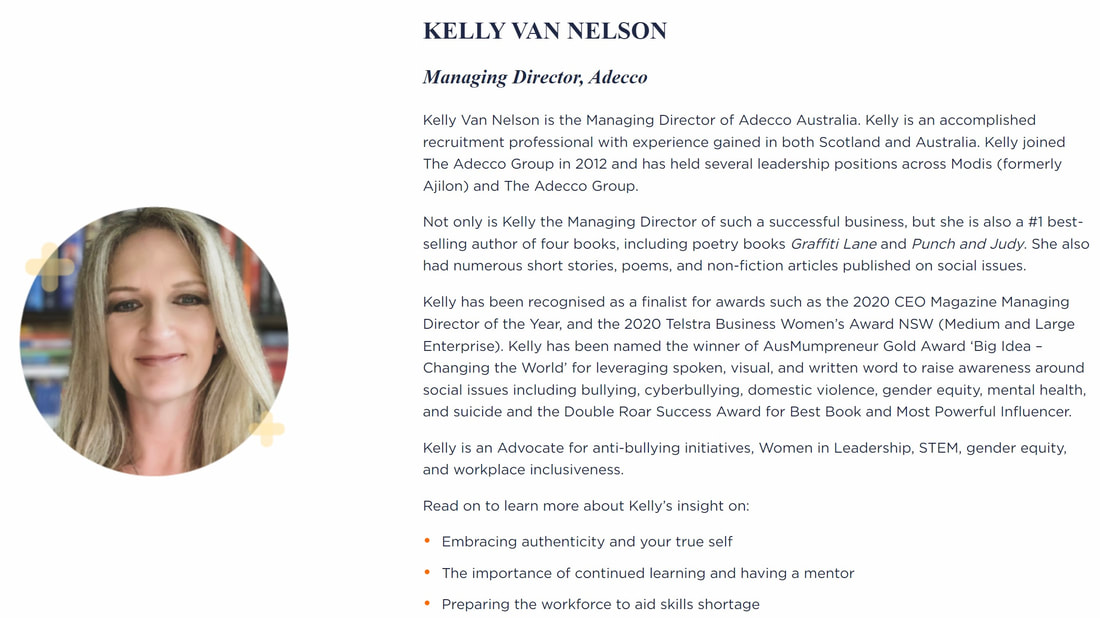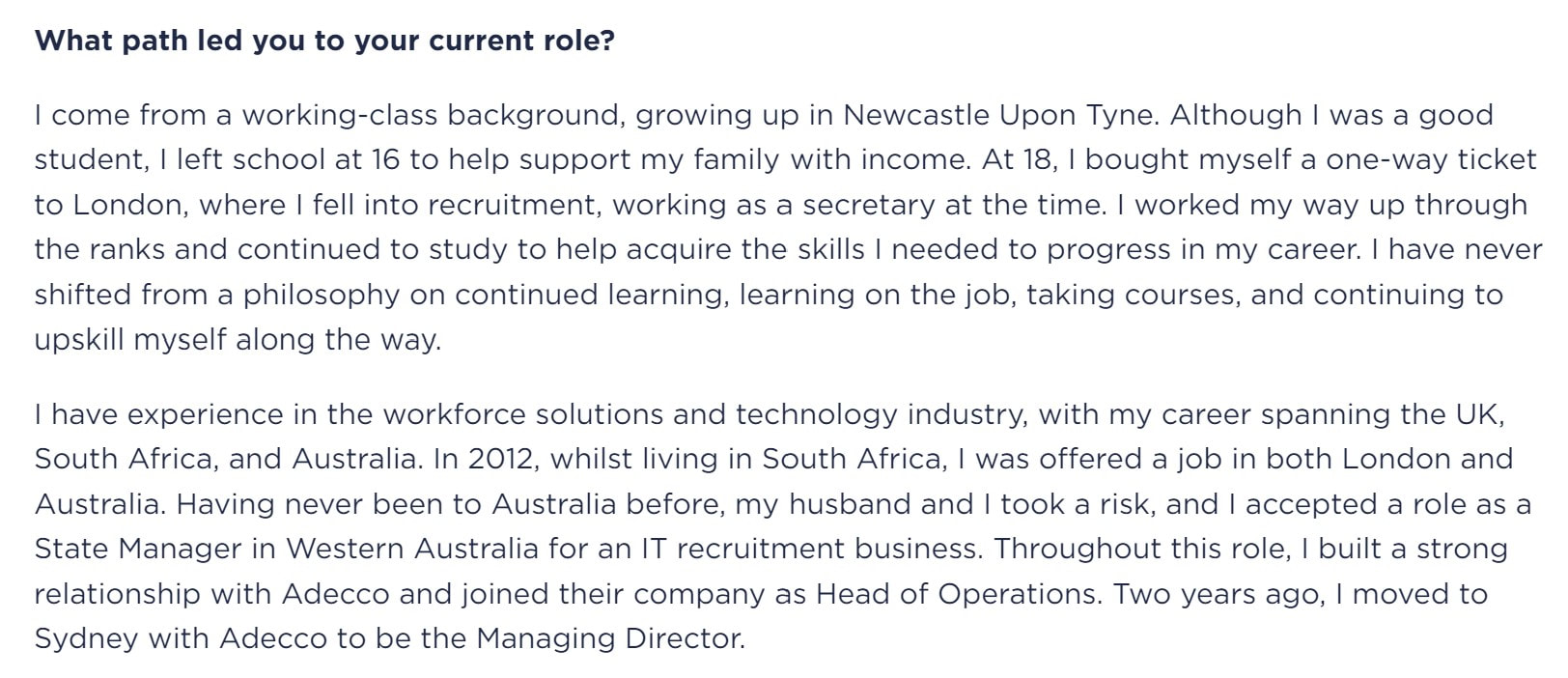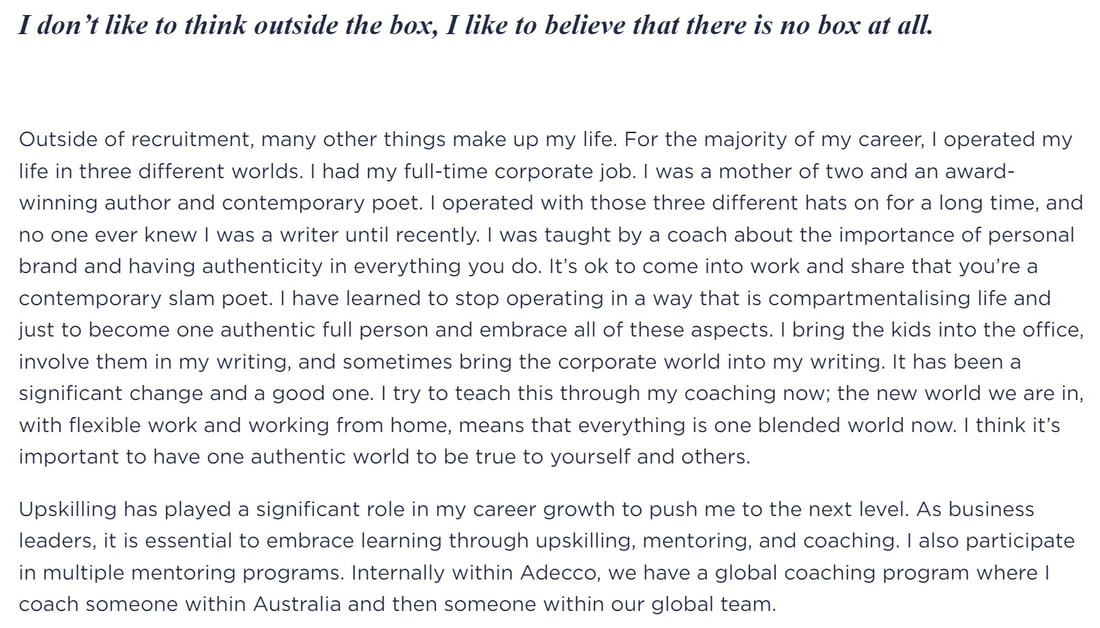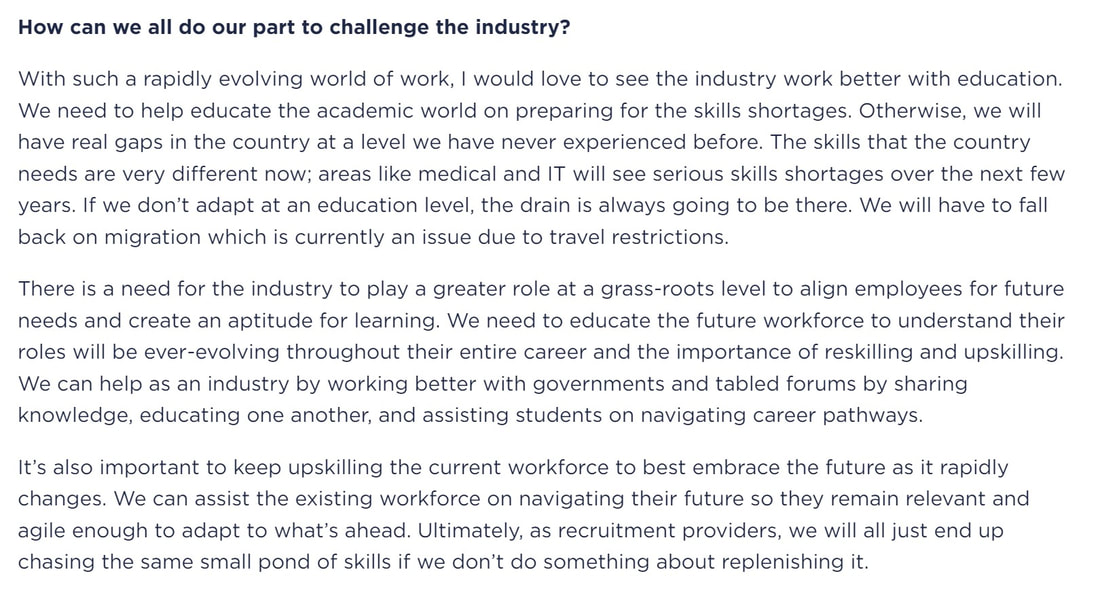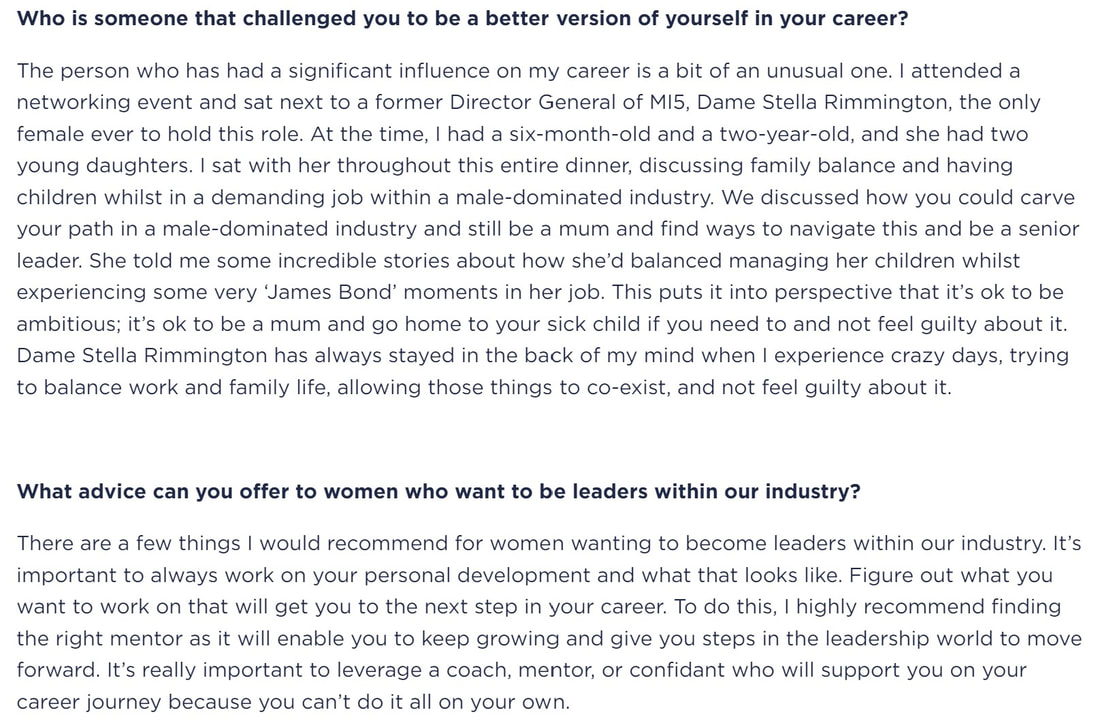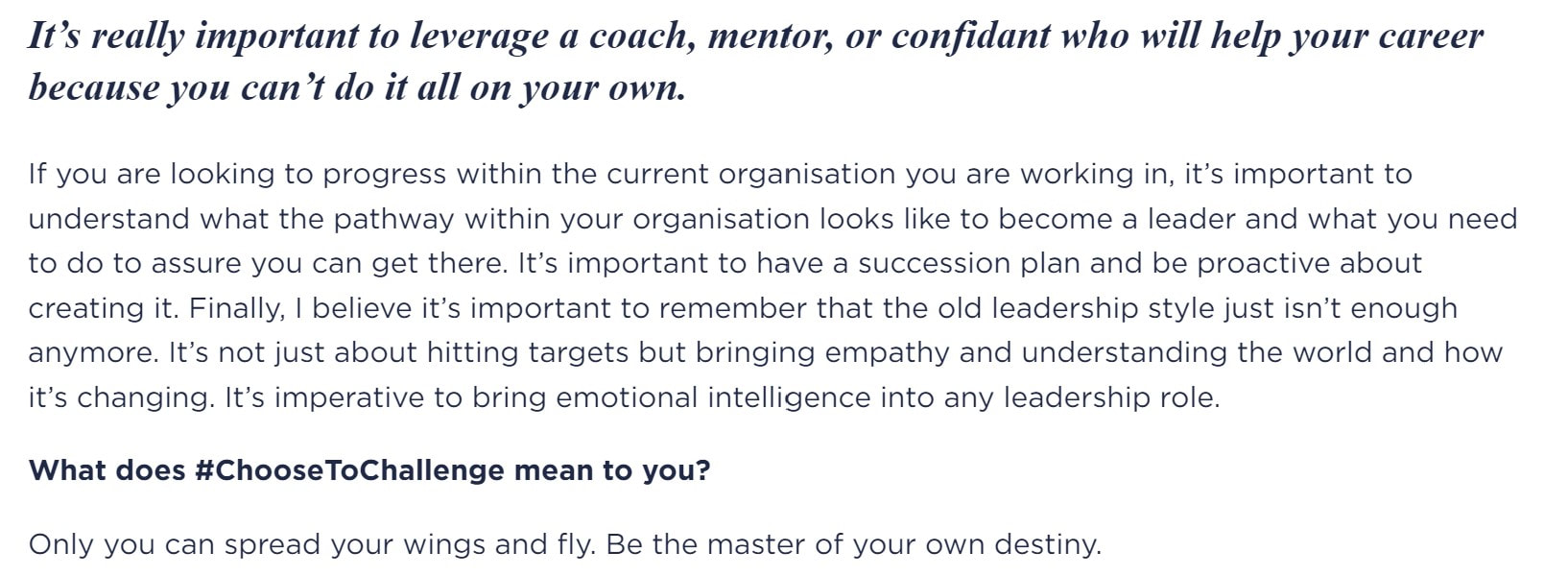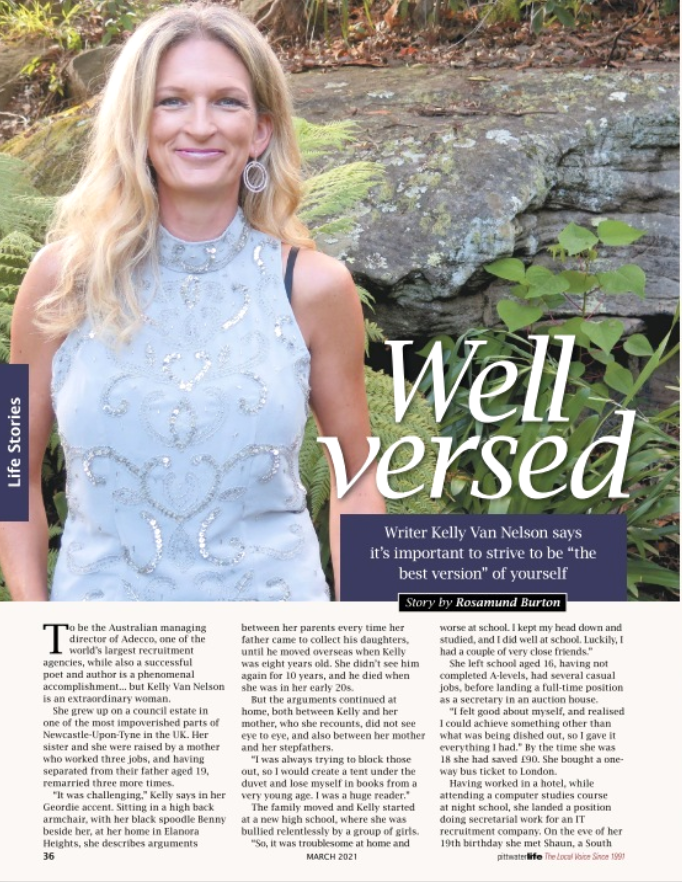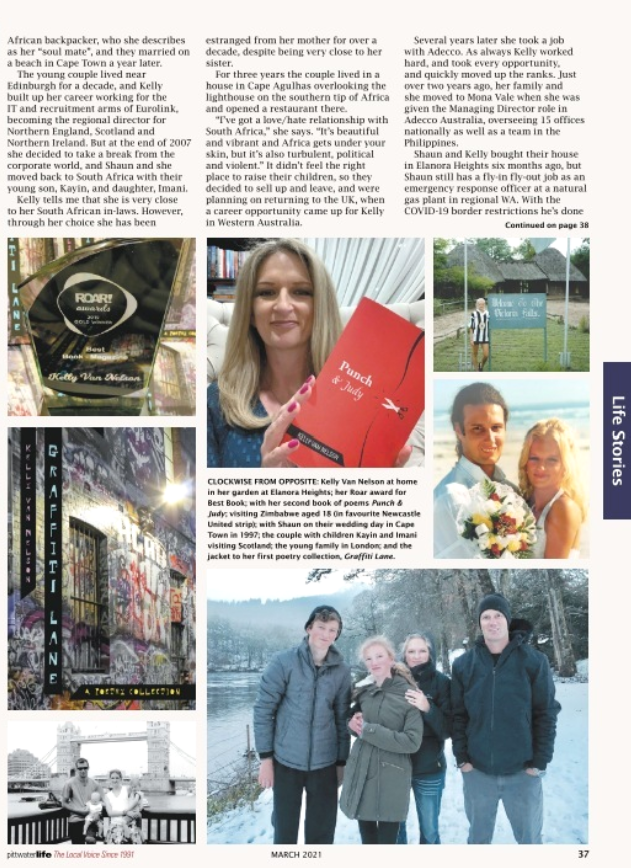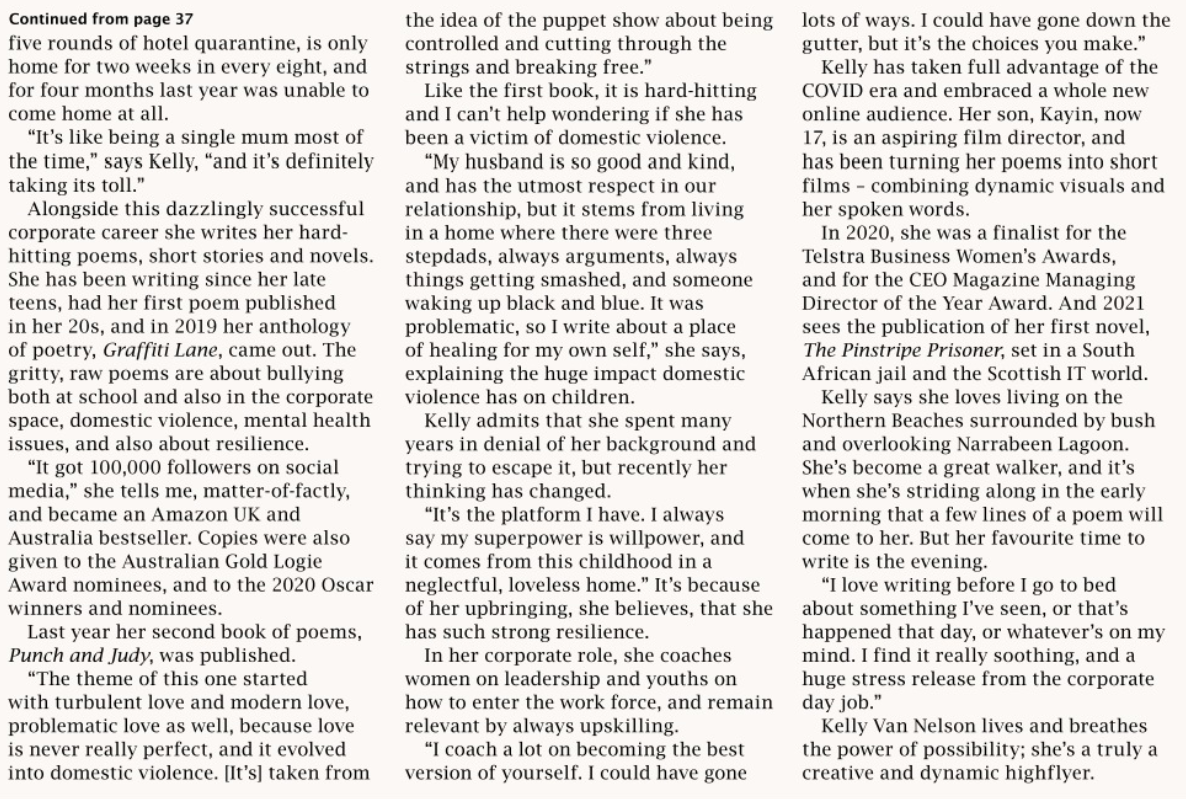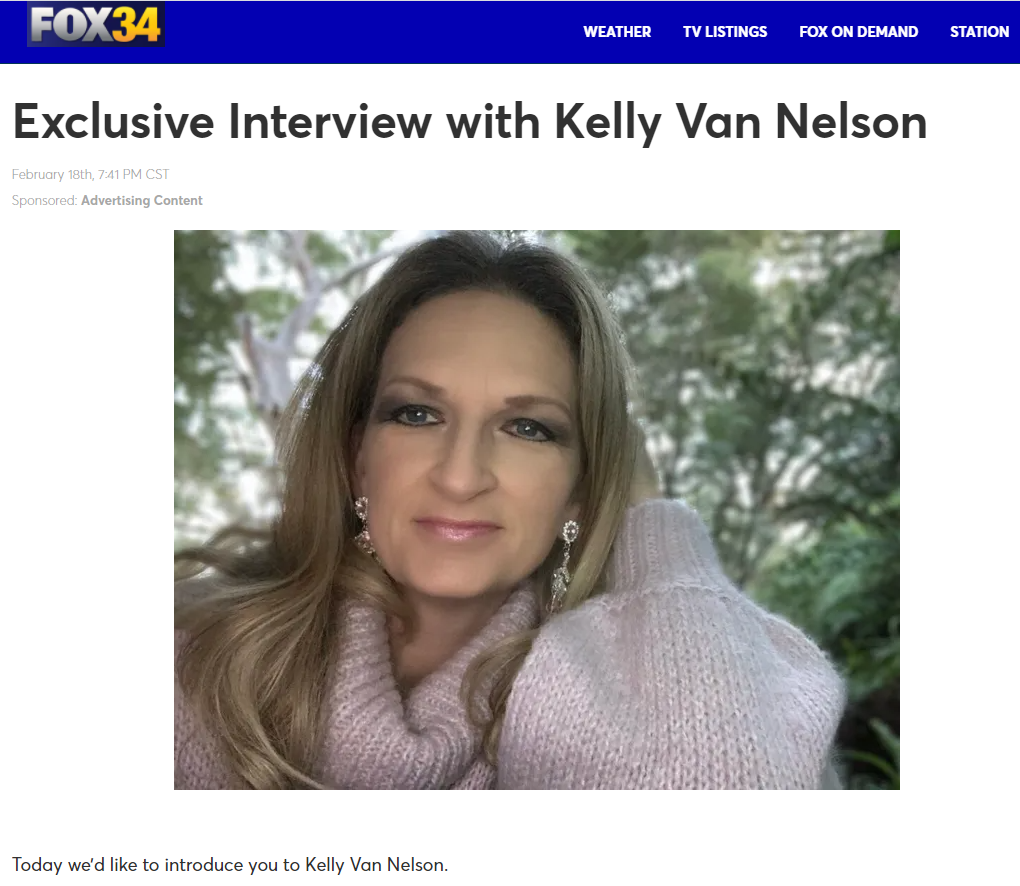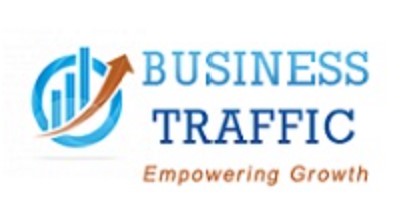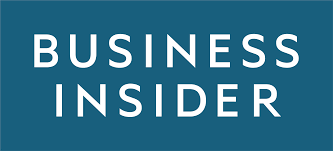|
International Women’s Day 2021
5 Incredible Women in Australian Recruitment Choosing to Challenge the Status Quo
0 Comments
Whether you’ve just begun the transition from school to a career, or you’ve been in the workforce for years, ensuring you acquire and maintain essential skills is crucial for career progression and growth.
Managing Director at Adecco Australia, Kelly Van Nelson, explained to Business Insider that an ever-shifting work environment can be attributed to skill-loss. “Research shows that every four years people effectively lose 30% of their technical skills because the work environment changes so quickly,” Van Nelson says.”The era of life-long jobs is coming to an end and the pace of change is getting faster with roles disappearing while new ones are created overnight. "The best line of defence you can have for your career is to ensure you’re constantly upskilling and moving away from the misconception that once you’ve completed your degree in your early 20’s, you’ve “arrived” at your destination. With every new skill, you have the potential to reinvent your role, your career and yourself.” Depending on the industry you’re in, or are looking to get into, the term ‘skills’ can appear quite broad, as each industry requires niche expertise that might not necessarily transfer over to another field. However, Van Nelson believes there are three skills that are applicable to any field you go into — soft skills, agility and resilience. “Soft skills are extremely favourable across all areas of work. Across industries, hiring managers are always looking for candidates with excellent communication skills, problem-solving skills, and the ability to work to deadlines,” Van Nelson asserts. “Today’s workforce is everchanging and chances are the role you’re hired for will likely evolve over the coming months and years. Candidates who have a proven ability to upskill, reskill and stay agile will be seen favourably by hiring managers. Van Nelson also points out that the need for adaptable team members is of the utmost importance in the wake of 2020. “Now more than ever during a global pandemic, candidates across all industries must show resilience. Resilient people can generally manage stress and conflict more effectively.” If you’re about to enter the workforce and believe you could advantage from some professional assistance in acquiring the three aforementioned skills, low-fee and free resources like NSW JobTrainer provides training for over a dozen industries including Design, Health, Information Technology and Engineering, so that could be a smart jumping-off point. JobTrainer is less formal than a university degree, which Van Nelson believes can actually work in your favour. “Today’s rapidly changing workplace makes acquiring and developing new skills more important than formal education, and the COVID-19 pandemic has emphasised the need for digital skills across all job roles. “Employees and job seekers should feel empowered to take time to self-educate and upskill in areas they may not have needed to before, to round out their skillset and get a competitive advantage over their peers.” Speaking from her own experience, Van Nelson’s company has also set up programs to ensure the employees continue to stay ahead of the curve. “The Adecco Group and Microsoft know that today’s roles are requiring everyone to lift their skills and as such developed a skills initiative that gives people access to free training, giving them the opportunity to remain relevant and employable for the jobs needed now and into the future. “Industries or roles where employees have had the ability to improve and develop their soft skills including critical thinking, adaptability, emotional intelligence, and negotiation will all prove beneficial if an employee is interested in shifting industries.” Click here to read the Business Insider article just released where I share the most important work skills to have in 2021.
Skills All Recruiters Love To See On A Resume, No Matter What Job You’re Applying ForIn these unusual times, it may be hard to ask for a pay rise. In this article written by Natasha Boddy for the Australian Financial Review, Michelle provides suggestions on how to do this during a pandemic.
Asking for a pay rise can be a difficult conversation at the best of times, but the coronavirus pandemic has meant convincing your boss is harder than it has been for years. The shift to remote work and the current economic climate meant pay rises last year were few and far between, if they were given at all. The recent resurgence of COVID-19 in NSW, Victoria and now Queensland is a reminder the pandemic is far from over and will continue to loom large for employers this year. “[For] any conversation with an employer around pay rises, the key thing is to pick your timing,” says workplace expert Michelle Gibbings. “Many organisations will be struggling, so asking for a pay rise at a time when they’re struggling to keep other employees on could be seen as highly unreasonable.” Kelly Van Nelson, managing director of human resources company Adecco Group, agrees. “Since many sectors have been hit hard by COVID-19, it’s critical to do your research before broaching the topic of a salary increase,” she says. “The key is to undertake an additional layer of research to assess your company’s performance and its macro environment so you can ensure that your request for a wage increase doesn’t come across as out of touch with current economic realities.” Workers who suddenly find themselves in hot demand in the current market could be the exception to the rule. Mercer’s 2020 remuneration survey reveals January, April and July are the most common salary review months for organisations. “Understanding the value you offer puts you in a stronger position to be able to negotiate a pay rise,” says Gibbings. Adam Gregory from LinkedIn says that now more than ever, it is essential to come to the conversation armed with the right information. Professionals need to demonstrate how they add value to the business. LinkedIn’s Adam Gregory says workers need to be mindful of the situation when asking for a pay rise. “As we face the challenges of a global pandemic, take an extra moment to consider the situation the business is in as this will ultimately weigh on the decision and the overall success of your salary discussions,” he says. SEEK Group HR director Kathleen McCudden notes many companies have paused pay rises and staff should think about whether it is appropriate to ask. “For most people, this is not the year to be asking for a pay rise,” she says. “That said, it may be worthwhile having an open conversation with your manager about the possibility of a pay increase in the future, once things are more certain and the business is showing signs of recovery.” So if you’re prepared to broach the topic with your boss, what is the best way to ask for a raise? 1. Do your homework The best way to increase your confidence is to prepare well and do your research. Give your boss plenty of notice that you want to talk about your role and pay, so they also have time to consider options, says McCudden. Consider talking to recruiters to understand the market for your specific skills and experience. Asking for a pay rise is like building a business case, Gibbings says. You will need to define why you deserve one. It could be that your pay is out of kilter with others in the market, or you may be doing something new to generate additional value. SEEK Group HR director Kathleen McCudden says for most people, this is not the year to be asking for a pay rise. 2. Know your worth Look up salary guides to understand the typical salary range for those in similar positions. LinkedIn Salary lets workers see how their pay compares with other workers in their industry and role, but be mindful the figures may be from before COVID-19. “This allows you to get a better understanding of your position and be armed with the right information to put forward a strong case for a pay rise,” says Gregory. McCudden recommends researching the salary of similar roles to help set realistic expectations for you and your employer. 3. Outline your achievements Should you decide to ask for a pay increase, speak to mentors in your industry whom you respect and trust to get an honest sense of your knowledge and capabilities. “Have clear examples to hand of your achievements throughout the year,” says Van Nelson. “Once you have a solid sense of these, it becomes easier to ask for a pay rise, especially if you’ve already collected all the supporting documentation necessary – like past performance appraisals or feedback from colleagues and clients.” Michelle Gibbings says asking for a raise is like building a business case: what’s the reason you deserve it? Gibbings agrees it is important for workers to understand what they’re offering and how it has changed from the past so they can show why it is reasonable to ask for a raise. McCudden says managers can be surprisingly far removed from the achievements staff make in their day-to-day role, so it’s important to bring them up to speed. “Talk them through what your role entails, how you’re delivering above and beyond the requirements, your career ambitions and objectives. This context helps your manager understand how you’re currently performing and where you’re aspiring to be.” 4. Manners go a long way As with all professional interactions, ensure you remain clear-headed and calm and be sure to send an email recapping what was discussed. Be prepared to wait as your manager might need time to reflect or consult with others before giving you an answer. “Usually these types of conversations will take place in stages, so be patient and understanding in relation to this,” McCudden says. 5. Have a plan B Have a fall-back plan in case you get knocked back. “Try considering ahead of time what alternatives you’d accept if your employer isn’t able to offer you the pay rise you want,” Van Nelson says. “A performance-based bonus, additional paid leave, professional training or flexible work arrangements tailored to you are all good options.” 4 ways to beat the competition in your 2021 job huntAs the world shakes off 2020 and economists forecast a strong rebound, many are feeling hopeful about their career prospects in the new year. While there are still just shy of a million unemployed Australians, if you’re on the hunt for a new job, there are some ways you can ensure you stand out. According to Australia’s top recruitment experts, flexibility, a strong resume, a bit of networking and online job profiles will serve jobseekers well in the face of stiff competition.
“My top tip to job-hunters is to challenge yourself to keep an open mind and remain flexible throughout your job search,” Adecco Australia managing director Kelly Van Nelson told Yahoo Finance. “Take the time to understand which of your skills are currently most in demand across the entire job market – not just within your industry – and then focus on how you might be able to bring these skills into roles and industries that you may not have traditionally considered for yourself. “This is an ideal time to aim to open new doors, in addition to re-approaching old ones,” she said. |
Archives
March 2024
|


